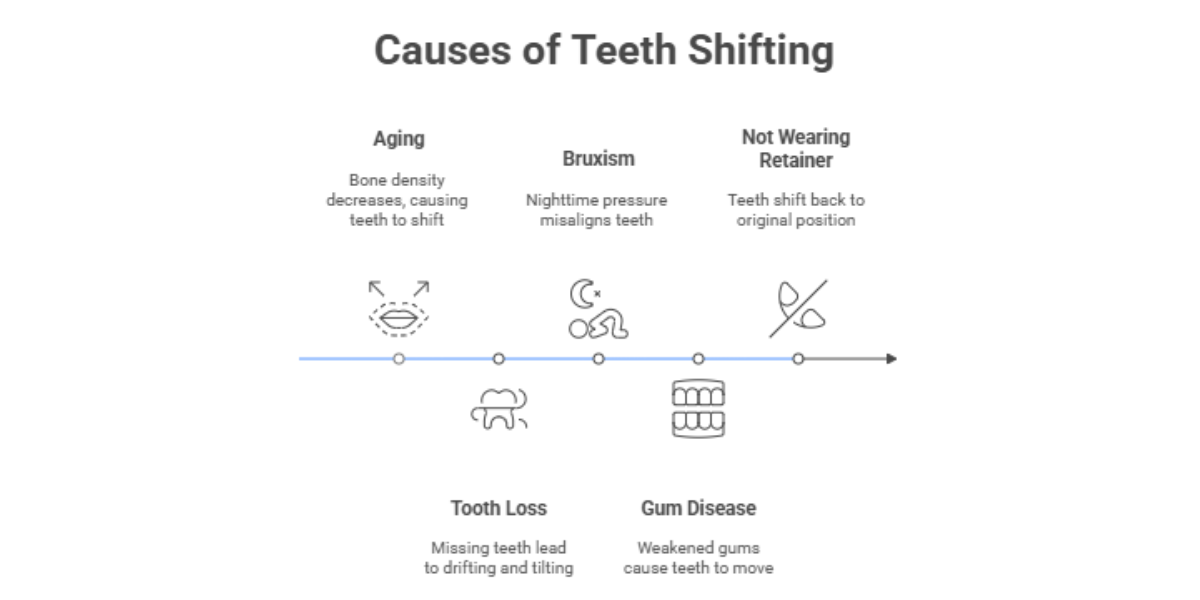Teeth Shifting Quickly? Why Braces or Invisalign Can’t Wait
Have you looked in the mirror recently and thought, “Wait... were my teeth always like this?”
If your smile looks a little off or you’ve noticed new gaps, crowding, or bite changes, you might be seeing the signs of teeth shifting.
Teeth can (and often do) move faster than you think, especially if they’re not being supported properly. At Paramus Orthodontics, we’ve seen many patients from Ridgewood, Paramus, and throughout Bergen County who come in worried about sudden changes in their smile.
In this blog, we’ll break down:
Why are your teeth shifting quickly
Why it’s a bigger deal than you might think
And how braces or Invisalign can help sooner, not later
Let’s get into it!
What’s going on, what to watch for, and how orthodontics can make a real difference.
First, Why Do Teeth Shift in the First Place?
Even if you had braces years ago or never noticed issues before, your teeth aren’t set in stone. They sit in soft tissues and bone that constantly respond to pressure, movement, and changes in your mouth.
Here are some of the most common reasons teeth begin to shift, sometimes very quickly:
1. Aging
As we age, the bone density in our jaw can decrease slightly, causing teeth to shift, particularly the bottom front teeth. Think of it like a slow, subtle settling of your smile over time.
2. Tooth Loss
Missing teeth (especially molars) can trigger surrounding teeth to drift or tilt into the gap, creating a chain reaction of misalignment.
3. Grinding or Clenching (Bruxism)
All that nighttime pressure can push teeth out of alignment and wear down enamel, making them more mobile and prone to movement.
4. Gum Disease
When gum tissue and bone around your teeth weaken due to infection, your teeth lose their support system and start to move.
5. Not Wearing Your Retainer
Yep, this is a big one. If you’ve had braces or Invisalign before but didn’t wear your retainer consistently (or it broke), your teeth will naturally try to shift back toward their original position. It’s called orthodontic relapse, and it’s one of the most common reasons people come back to us.
How Do You Know If Your Teeth Are Shifting?
Great question! The signs can be subtle at first, but once you know what to look for, you’ll start to notice them quickly.
Here are some red flags to watch for:
Crowding in the bottom front teeth
New spaces or gaps forming between teeth
Bite feels different, food doesn’t hit the same when you chew
Smile looks “off” or uneven in photos
Jaw soreness or tension, especially in the morning
Difficulty flossing between teeth that used to be easy
Rotated teeth (especially canines or premolars)
The retainer doesn’t fit anymore
If you notice one or more of these symptoms, your teeth may be shifting, and the sooner we catch it, the easier it is to fix.
“It’s Not That Bad… Can’t I Just Wait?”
We totally understand. It’s easy to put off dental or orthodontic treatment, especially when life is busy. But here’s the truth:
Waiting can make things worse.
When teeth shift, they don’t just stop on their own. That movement continues, and eventually, it starts affecting more than just how your smile looks.
What Happens If You Delay Orthodontic Treatment?
More Misalignment - The longer you wait, the more complex your case becomes.
Higher Cost - Early intervention is usually more affordable than fixing advanced issues later.
Uneven Wear - Misaligned teeth can grind unevenly, wearing down enamel and increasing sensitivity.
TMJ Problems - Bite issues can cause jaw pain, headaches, or even lockjaw over time.
Harder to Clean - Crooked teeth are magnets for plaque buildup, which can lead to cavities and gum disease.
If your teeth are shifting, braces or Invisalign aren’t something to “eventually” consider; they’re something to take action on now.
Braces vs. Invisalign: What’s Best for Shifting Teeth?
At Paramus Orthodontics, we offer braces and Invisalign clear aligners because both are excellent choices for correcting shifting teeth.
Let’s compare them, side by side:
Braces
Best for moderate to severe shifting
Always working, you don’t need to remember to wear them
Options include clear ceramic or traditional metal
Can address complex bite issues and jaw alignment
Invisalign
Great for mild to moderate shifting
Nearly invisible and removable, perfect for adults and professionals
No food restrictions
Requires compliance to wear for 20–22 hours a day for results
Pro tip: If you had braces before and your teeth have relapsed slightly, Invisalign is often the perfect solution for getting your smile back on track without anyone noticing.
During your consultation, we’ll take a look at your specific situation and recommend the treatment that best fits your smile, lifestyle, and goals.
What If I Already Had Braces or Invisalign?
Many of our adult patients had orthodontic treatment as teens and are surprised (and frustrated) to see their teeth moving again.
Here’s what’s likely happening:
You didn’t wear your retainer consistently (don’t worry, it happens!)
Your jaw continued to grow or shift slightly into adulthood
You had wisdom teeth push other teeth out of alignment
Gum or bone changes are affecting the tooth position
In many cases, we can get you back to your perfect smile with a short Invisalign touch-up or minor braces treatment. You don’t need to start over; you just need a little help from a professional.
What to Expect at Your Consultation
If you’re worried about your teeth shifting, your first step is to book a complimentary consultation with our friendly team at Paramus Orthodontics.
Here’s what you can expect:
Digital Imaging
We’ll take a 3D digital scan of your teeth (no goopy impressions!) to show exactly how your teeth have moved and where they should be.
Expert Evaluation
Dr. Yoon will examine your bite, jaw, and alignment to diagnose what’s going on and how best to fix it.
Personalized Treatment Plan
You’ll get a clear explanation of your options, the timeline, and cost, no pressure, no surprises.
Flexible Financing
We offer payment plans and work with most major insurances to make treatment affordable.
Whether you live in Ridgewood, Paramus, or anywhere in Bergen County, we make it easy to start!
Don’t Let Your Smile Shift Away From You
Teeth shifting might start small, but left untreated, it can create big problems down the line.
Here’s what we want you to know:
You are not alone.
It’s not too late to fix it.
And you deserve a smile you feel great about.
At Paramus Orthodontics, we help teens and adults of all ages correct shifting teeth, restore alignment, and regain confidence with braces or Invisalign tailored to you.
Let’s Fix It Before It Gets Worse.
Call us today at (551)-400-8959 or schedule your consultation online.
Still have questions about shifting teeth, braces, or Invisalign?
Let us know, we’d love to answer them in a future blog post or during your first visit!



